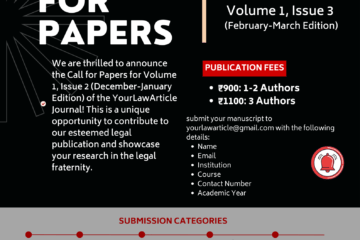
About the Book
In today’s rapidly evolving business landscape, traditional litigation processes often fall short in resolving disputes efficiently and cost-effectively. “Beyond Litigation: Business Growth with Arbitration and ODR Strategies” delves into the transformative potential of arbitration and online dispute resolution (ODR) techniques for businesses aiming not just to resolve disputes, but to fuel growth and prosperity.
This edited volume brings together leading experts in arbitration, ODR, and business strategy to explore how alternative dispute resolution methods can serve as catalysts for organizational success. Through a series of insightful chapters, readers will gain practical insights into the strategic application of arbitration and ODR across various industries and contexts.
From mitigating risks and preserving business relationships to enhancing operational efficiency and maintaining competitiveness, the book demonstrates how arbitration and ODR can unlock new opportunities for growth while minimizing the disruptive impact of conflicts. Case studies and real-world examples illustrate the tangible benefits that businesses can derive from adopting proactive dispute resolution strategies tailored to their unique needs.
Whether you are a business leader, legal practitioner, or scholar seeking to stay ahead in today’s dynamic business environment, “Beyond Litigation” offers indispensable guidance on harnessing the power of arbitration and ODR to drive sustainable business growth and achieve strategic objectives.
About the Editor
Mr. Atin Handuja is a legal entrepreneur deeply inclined towards Alternative Dispute Resolution (ADR), Arbitration, and Online Dispute Resolution (ODR), passionately dedicated to revolutionizing the legal landscape. He founded LEGALFOXES SOURCING PRIVATE LIMITED, a prominent provider of comprehensive legal support to businesses worldwide.
With a Master of Laws degree in Intellectual Property Law and a Bachelor of Laws degree from Guru Gobind Singh Indraprastha University, his expertise spans the breadth of the legal domain, particularly in International Commercial Arbitration. In addition to spearheading his legal outsourcing company, he serves as the M Partner at LEGALFOXES Advocates and Consultants. He is driven by a commitment to devising innovative solutions to legal complexities and takes immense pride in facilitating his clients’ success.
Mr. Atin Handuja is honored to hold the esteemed position of President at Justice Remedem – Centre for Conflict and Online Dispute Resolution. This multinational center, comprising members from across the globe, is dedicated to advancing Alternate Dispute Resolution in India, a burgeoning trend poised to shape the future of conflict resolution.
Furthermore, he is the Publisher and Editor-in-Chief of two indexed, open-access, peer-reviewed law journals: Legalfoxes Law Times and International Journal of Alternative Dispute Resolution. His dedication to fostering knowledge exchange and scholarly discourse in the realm of ADR underscores his commitment to the field.
He is an active member of various prestigious forums, including the Chartered Institute of Arbitrators, SIAC, MCIA, and other international bodies, reflecting his enduring dedication to advancing the cause of ADR on a global scale.
Sub-themes
- Strategic Adoption of Arbitration and ODR: Exploring how businesses can strategically integrate arbitration and ODR into their operations to foster growth and enhance competitiveness.
- Risk Mitigation and Conflict Prevention: Discussing proactive measures businesses can take to identify and mitigate potential disputes, thus safeguarding their interests and promoting long-term growth.
- Operational Efficiency and Cost Savings: Analyzing the cost-effectiveness and efficiency gains associated with arbitration and ODR compared to traditional litigation, and how these factors contribute to business growth.
- Preserving Business Relationships: Examining strategies for resolving disputes amicably through arbitration and ODR to preserve valuable business relationships and foster continued collaboration and growth.
- Global Expansion and Cross-Border Disputes: Addressing the unique challenges businesses face when expanding internationally and exploring how arbitration and ODR can facilitate the resolution of cross-border disputes and support global growth initiatives.
- Innovation in Dispute Resolution Technologies: Highlighting the latest technological advancements in ODR platforms and tools, and their role in driving efficiency, accessibility, and effectiveness in dispute resolution processes.
- Legal and Regulatory Considerations: Providing insights into the legal and regulatory frameworks governing arbitration and ODR, and how businesses can navigate these complexities to optimize their dispute resolution strategies and support sustainable growth.
- Case Studies and Best Practices: Presenting real-world case studies and examples of businesses that have successfully utilized arbitration and ODR strategies to resolve disputes, mitigate risks, and achieve business growth objectives.
- Building a Culture of Dispute Resolution: Exploring how businesses can foster a culture of proactive dispute resolution, empower stakeholders to engage constructively in conflict resolution processes, and embed arbitration and ODR principles into organizational norms and practices.
- Future Trends and Emerging Opportunities: Anticipating future trends and developments in arbitration and ODR, and discussing how businesses can stay ahead of the curve to leverage emerging opportunities for growth and innovation in dispute resolution strategies.
- Negotiation and Settlement Techniques: Exploring practical negotiation strategies and settlement techniques that complement arbitration and ODR processes, emphasizing collaborative problem-solving and mutual agreement.
- Effective Use of Mediation in ODR: Examining the role of mediation within online dispute resolution frameworks and providing practical guidance on how businesses can leverage mediation to achieve efficient and satisfactory outcomes in resolving conflicts.
- Implementation of ODR Platforms: Offering practical insights into selecting and implementing ODR platforms and technologies, including considerations such as user interface design, data security, and integration with existing business systems.
- Training and Capacity Building: Discussing the importance of training programs and capacity-building initiatives to equip stakeholders with the skills and knowledge necessary to effectively engage in arbitration and ODR processes, both within organizations and across supply chains.
- Monitoring and Evaluation of ODR Systems: Providing practical methodologies for monitoring and evaluating the effectiveness of ODR systems, including metrics for measuring efficiency, accessibility, user satisfaction, and overall impact on business performance.
- Psychological Aspects of Dispute Resolution: Exploring psychological theories and principles that underpin effective dispute resolution strategies, including concepts such as negotiation dynamics, cognitive biases, and emotional intelligence.
- Legal Theory and Arbitration Practice: Investigating theoretical frameworks within legal scholarship that inform the practice of arbitration, including theories of contract law, procedural justice, and the role of judicial discretion in enforcing arbitration agreements.
- Economic Analysis of Dispute Resolution: Applying economic theories and models to analyze the costs and benefits of arbitration and ODR compared to traditional litigation, including considerations such as transaction costs, information asymmetry, and incentives for settlement.
- Sociological Perspectives on Conflict Resolution: Examining sociological theories and perspectives on conflict resolution, including the role of power dynamics, cultural norms, and social institutions in shaping the outcomes of arbitration and ODR processes.
- Ethical Considerations in Dispute Resolution: Reflecting on ethical dilemmas and ethical frameworks relevant to arbitration and ODR practice, including principles of fairness, impartiality, confidentiality, and the ethical responsibilities of arbitrators, mediators, and other stakeholders.
Formatting Guidelines
- All submissions must follow the Bluebook (20th Edition) style of citation; non-conformity will be a ground for rejection.
- Submissions must be in Times New Roman font, with size 12 and line spacing 1.5.
- All footnotes must be in Times New Roman font, with size 10 and line spacing 1.
- Submissions must be made in .doc/.docx formats only.
- The documents must not contain any identification markers. Eg: Name of the author after the title, Author as recognized by Word, or any other metadata.
- The receipt of submission will be intimated to the authors within two weeks of submission.
How to Submit?
Interested candidates can submit via the link given at the end of the post.
Deadline
Submission of abstract/ Full chapter – June 30.
Contact
E-mail: secretariat.justiceremedem@gmail.com
For other queries: +91 7011524783
Application Form
https://docs.google.com/forms/d/e/1FAIpQLSeiTLnXujpxvqliE4my8_-sD382NFGRAHXGvX3O2kTIwYtOhw/viewform




0 Comments